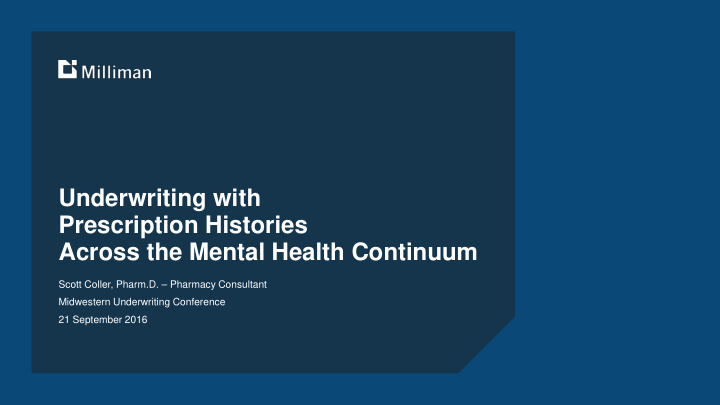



Underwriting with Prescription Histories Across the Mental Health Continuum Scott Coller, Pharm.D. – Pharmacy Consultant Midwestern Underwriting Conference 21 September 2016
Agenda Psychotropic Medications Medications and Disease Progression Drug Combinations and Mortality Rule Engines Interpret Psych Meds Rule Results, UW Guidelines and Decisions
Drug therapies impact many neurotransmitters . Drug Name Dopamine Histamine Norepinephrine Serotonin Acetylcholine Glutamate GABA
Neurotransmitters influence a wide range of mental states. Dopamine & Norepinephrine & Histamine Acetylcholine Attention Cognition Vigilance (Mental Alertness) (Sustained Concentration) MOOD Appetite Intuition Serotonin & Glutamate Perception (Sensory Satisfaction) GABA
There are a few key categories of psychotropic meds. Antidepressants and Anxiolytics Antipsychotics Mood Stabilizers Others Stimulants Cognitive Enhancers
Doctors prescribe by condition. Depression Anxiety Benzodiazepines Insomnia SSRI’s, SNRI’s Nausea Tricyclics, Tetracyclics, Modified Cyclics Neuropathy Antipsychotics Migraine Prevention Anticonvulsants Tourette’s Stimulants Obsessive/Compulsive GABA Analogs Bupropion Bipolar Schizophrenia ADHD
Underwriters use Rx histories to interpret conditions. Depression Anxiety Insomnia Benzodiazepines Nausea SSRI’s, SNRI’s Neuropathy Tricyclics, Tetracyclics, Migraine Prevention Modified Cyclics Tourette’s Antipsychotics Obsessive/Compulsive Anticonvulsants Stimulants Bipolar GABA Analogs Schizophrenia Bupropion ADHD Smoking Cessation Epilepsy
Rules engines can be used to map drugs to likely conditions.
A Sesame Street Mnemonic for Mental Disorders Insomnia Depression Obsessive Compulsive Disorder (Anxiety) Bipolar Disorder Schizophrenia
Insomnia Fall asleep or stay asleep as long as desired Symptom of another disorder Functional impairment while awake < 3 hrs or >10 hrs increases mortality by 50-100%. 7 hours per night: lowest mortality † † Kripke DF, et al. Arch Gen Psychiatry. 2002;59(2):131-136.
How Medications Treat Insomnia Benadryl Trazodone & Seroquel Melatonin Rozerem Temazepam & Ambien Belsomra
Major Depressive Disorder (MDD) Low mood, low self-esteem, loss of interest Targets: Norepinephrine, Serotonin, Dopamine SSRI, SNRI Bupropion Tricyclic MAO-I Antipsychotic
Estimating MDD Progression Single agent SSRI or SNRI Multiple agents, non-concurrent Trial and transition Multiple agents, concurrent AD + BZD Multiple AD AD + AP AD + AC
How Medications Treat Anxiety GAD, Panic, Social Anxiety, Phobias, OCD, PTSD Targets: GABA Serotonin SSRI, SNRI, TCA Benzodiazepines GABA analogs Buspirone Antipsychotic
Estimating Anxiety Progression SSRI for maintenance with benzodiazepine for breakthrough / symptomatic relief Benzodiazepine monotherapy Pregabalin or buspirone monotherapy Multiple agents, concurrent Combinations of above Anticonvulsants Antipsychotics
Bipolar Disorder Periods of mania/hypomania alternating with depression Bipolar I, Bipolar II, Cyclothymia, Mixed, Rapid Cycling
Estimating Bipolar Progression Starting therapy: Lithium and/or Depakote +/- antipsychotic Lithium and/or Lamictal +/- antidepressant Maintenance: Lithium, Depakote, Lamictal, Tegretol, Trileptal or Antipsychotics
Schizophrenia Suicide Risk At least 2 symptoms present for six months Negative: Flat affect, lack of pleasure in daily life, lack of drive, speaks little Positive: Hallucinations, delusions, thought disorders, movement disorders Cognitive: Poor executive functioning, trouble focusing, problems with working memory
Estimating Schizophrenia Progression Thought disorder, mood disorder, and anxiety disorder Antipsychotics are first line but others may be added on Clozaril is probably most effective Three-quarters of all patients stop taking their medications
Rule engines can manage relative mortality.
What is RxRules? Data Input RxRules UW Guidance Rx info Conditions Application data Severity Other (MIB, MVR) Decisions Rule Variables Indication / Therapeutic class Drug combinations Fill timing(date or duration ranges) Fill counts / patterns Dosage / quantity Physician specialty / count Gender / Age Other variables
RxRules Schizophrenia Treatment-resistant Treatment Insomnia Depression Bipolar Likely Treatment Possible Treatment Possible Likely
Underwriting expertise remains critical. Decline Data Input RxRules Rx info Review App data Other (MIB, MVR) Accept
Interpreting a long list of psych meds? Yikes!
Fill details provide insight to conditions and severity.
A rule engine supports easy decision-making.
Summary There is a wide range of psychotropic medications used to treat a wide range of mental health disorders. It is difficult to reverse engineer medications to determine likely conditions and severity. A rule engine can bring consistency and efficiency to a very challenging job!
Thank you! Questions? Scott Coller, PharmD scott.coller@milliman.com 262-641-3527
Recommend
More recommend